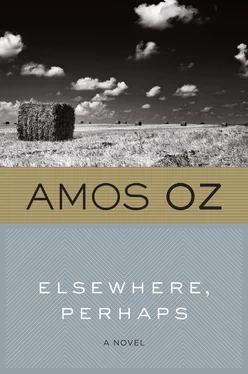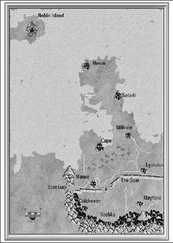Amos Oz - Elsewhere, Perhaps
Здесь есть возможность читать онлайн «Amos Oz - Elsewhere, Perhaps» весь текст электронной книги совершенно бесплатно (целиком полную версию без сокращений). В некоторых случаях можно слушать аудио, скачать через торрент в формате fb2 и присутствует краткое содержание. Год выпуска: 1985, Издательство: Mariner Books, Жанр: Современная проза, на английском языке. Описание произведения, (предисловие) а так же отзывы посетителей доступны на портале библиотеки ЛибКат.
- Название:Elsewhere, Perhaps
- Автор:
- Издательство:Mariner Books
- Жанр:
- Год:1985
- ISBN:нет данных
- Рейтинг книги:4 / 5. Голосов: 1
-
Избранное:Добавить в избранное
- Отзывы:
-
Ваша оценка:
- 80
- 1
- 2
- 3
- 4
- 5
Elsewhere, Perhaps: краткое содержание, описание и аннотация
Предлагаем к чтению аннотацию, описание, краткое содержание или предисловие (зависит от того, что написал сам автор книги «Elsewhere, Perhaps»). Если вы не нашли необходимую информацию о книге — напишите в комментариях, мы постараемся отыскать её.
Elsewhere, Perhaps — читать онлайн бесплатно полную книгу (весь текст) целиком
Ниже представлен текст книги, разбитый по страницам. Система сохранения места последней прочитанной страницы, позволяет с удобством читать онлайн бесплатно книгу «Elsewhere, Perhaps», без необходимости каждый раз заново искать на чём Вы остановились. Поставьте закладку, и сможете в любой момент перейти на страницу, на которой закончили чтение.
Интервал:
Закладка:
There is a flirtatious lilt in her voice as she speaks. She is urged on by cruelty, but even her cruelty is — if we may be forgiven for saying so — so faint and gentle that our heart goes out to her. Besides, she has spoken the truth. Rami Rimon is indeed blushing. He looks down at the floor to hide the extraordinarily horselike curl of his lips. Is it any wonder that Noga redoubles her laughter, and in a shabby gesture hurls the packet of embroidery thread at him?
"Head up, Rami, don't hide, fight back. I want to see you fight."
This remark fills Ezra with a dejection that accords ill with his words. He lays his hand on Noga's bare knee, then withdraws it, and puts a finger to his eye as if he has got something in it. Turning to Rami, he says, in a changed voice:
"You see what I mean, my boy. Let's play a new game now. Let's play at being brothers."
Rami gives a look like a beaten horse, gets up, leans toward Noga and hisses.
"Snake. Just like your mother. Poisonous little snake."
On his way out he almost collides with Dafna, who has crept back to spy on the room from behind the door. In his fury he slaps her face. Her tears bring him back to his senses. His eyes, too, redden.
Meanwhile, inside the room, nothing has happened. Ezra is still sitting silently on the only chair; all he has done is to drop his cigarette end and stamp on it, covering his eyes with his hand. He drags his words out slowly:
"Don't worry. He'll be back. He'll behave himself now. You have to deal firmly with them sometimes. A man must remember where he comes from and where he's going, as the saying goes."
As he talks, he strokes his young friend's hair with his fingertips and sinks back into his silent ponderings. If she hates me now, she'll be his, and it'll be better for both of them. If she doesn't hate me, it's a sign that really. That I must. That it's fated. Everything is written, for men and beasts alike. And it is written: "One who is alone when he falls has not another to help him up." And in the same book: "Their love and their hatred and their envy are now perished." I wanted to know. I wanted to force a decision. Now.
"Now I'm off, too, Turquoise."
"Stay."
"No, I won't stay. You need to be alone now."
"You're not nice, Ezra. You're not…"
"Of course I'm not nice. Good night, Turquoise. I'm not nice, but…"
"But what?"
"Nothing, Turquoise. Good night."
Rami did not go back to Noga's room that night, or the next day, or during the days that followed. Three days before the festival he took his leave of his widowed mother and set out to make his name as a hero. Oh, how painful were those last hours for Fruma Rominov! She tried with all her strength not to break down and cry, but her strength was hardly up to the effort. She put all her loving care into her son's kit bag, as if it was the kit bag that was going off to face danger. In her devotion to her only remaining son she ironed his underwear, his handkerchiefs, and even his socks, a completely unnecessary action. She packed a tin of home-made cookies in the bottom of the bag, and a brand-new toilet set. She embroidered flowers on the toilet bag with her own hands. Even though she abhorred tobacco, she put in ten packets of special cigarettes that she had recently asked Isaac Friedrich, the treasurer, to buy for her, not the usual cigarettes that the kibbutz provides for its members. She did not overlook the slightest detail: bootlaces, bandages, plasters, three sorts of pills, talcum powder, the last photograph of Alter Rominov and the last photograph of Yoash Rimon, resplendent in officer's uniform, and even a picture of herself as a young woman. She also put in some writing paper, envelopes, and stamps. When she had packed everything, she unpacked it all and ironed the bag itself.
Rami did not repay his mother's affection in kind. His movements were cold and curt. He turned the kit bag upside down, poured out the contents, and extracted whatever was superfluous. He was particularly scornful about the stamps: every child knew that armed forces' mail didn't need stamps. To his credit it must be admitted that, after tearful pleas and sighs, he consented, though with a bad grace, to take the cookies with him. On the other hand, he refused even to bargain about a bag of grapes. They would be bound to get squashed and make everything else in the bag dirty. And, anyway, he'd be ashamed to turn up at an army camp all laden with goodies like a child going to kindergarten. The only thing lacking was for his mother to wet his hair and arrange it in pretty curls. The widow showered her son with advice and warnings. Rami nodded his head and smiled a rude, heedless smile. She embraced him and kissed him on the mouth. The boy did not resist her hugs, but neither did he respond to them with any sign of affection. Fruma tried to persuade him to go and say good-bye to his girl friend, Noga. Why wouldn't he make it up with her before he left? They must have quarreled about something quite trivial. There was no doubt that she wished him well. The boy scowled and cursed. He'd never go and see her, even if she came groveling on all fours. The widow bit her lip.
Finally Rami relented and forced himself to kiss his mother. His kiss broke down all her defenses. She burst into uncontrollable tears. How touching she looks when she cries, like an elderly baby. Her ugly weeping sears us. We feel like forcing Rami to have pity on her and fling himself on her neck. Good-bye, Mother, I'll write to you. Look at my boy, isn't he handsome, look at him, curse you, look how fine he looks, he's a sensitive boy, if you only knew, he loves nature, only he's reserved, but I know that he's a poet at heart, my fine son.
Rami shoulders his kit bag and leaves. On his way to the car he makes a detour to the cow shed. This is where he has been working for the past year, and he has to say good-bye to the other workers. But how silly of me to forget; there's no one here at this time of day. Only the bull stares at Rami Rimon with his bloodshot eyes. Rami puts his hand through the railings and slaps the bull's jaws. The bull responds with a gust of warm, damp breath. You're a great bull, Titan; don't let them slaughter you. Give them a corrida when they come to get you. Olé, olé!
He puts his hand through the bars again and fondles the ring in the bull's nose. The bull answers with a hollow moan. Good-bye, Titan. Rami loves you truly, because Rami has a sensitive heart.
12. THREE PATHS
Rabbi Naphtali Hirsh Berger, the father of the three Berger brothers, was the cantor in a synagogue of peddlers and waggoners on the outskirts of Kovel. He was a little man of almost unnaturally clumsy proportions, with short, stout legs, a pot belly, and no neck to intervene between his strong, bulging shoulders and his huge dark bull head. His expression was one of drowsy gravity. These features are reflected in the face of young Oren Berger. What was surprising to observe was the almost complete absence of eyes: two tiny slits in a dense network of deep wrinkles, but both sparkling an amazing blue. Another surprise was the pure, strong tenor voice that would burst suddenly from the powerful chest through the thick black beard. He would stand for two or three hours on end in the stone-paved square of the suburb, quite motionless except for the rhythmic chewing of his huge jaws on a quid of tobacco and an occasional jet of yellow juice. It was said that no one had ever seen him happy or sad; he was always just the same, going about his business but with his mind apparently on other things. His business was that of cantor and to some extent that of synagogue treasurer. He performed his tasks without enthusiasm, but without carelessness. His thoughts may have wandered or they may have been concentrated; either way they were always somewhere else, never where he was. There were other men like him in our town; we knew how they earned their livelihood, but we never knew what motivated them, or what they thought about. He always seemed to be daydreaming. Whether or not he actually dreamed, even his three sons, his own flesh and blood, did not know. The Germans came and took him and roasted him in the furnaces of Sobibor. That was long after his wife had died, long after his sons, one by one, had severed their links with their father. His sons all traveled long paths. Sometimes, though, they still recall the tiny blue sparks lost in the rugged contours of his face.
Читать дальшеИнтервал:
Закладка:
Похожие книги на «Elsewhere, Perhaps»
Представляем Вашему вниманию похожие книги на «Elsewhere, Perhaps» списком для выбора. Мы отобрали схожую по названию и смыслу литературу в надежде предоставить читателям больше вариантов отыскать новые, интересные, ещё непрочитанные произведения.
Обсуждение, отзывы о книге «Elsewhere, Perhaps» и просто собственные мнения читателей. Оставьте ваши комментарии, напишите, что Вы думаете о произведении, его смысле или главных героях. Укажите что конкретно понравилось, а что нет, и почему Вы так считаете.












